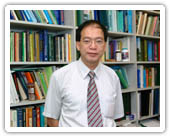
Prof. WONG Ming-hung 黄銘洪(HKBU)
Abstract
Persistent Organic Pollutants (POPs) included the original 12 chemicals listed in the Stockholm Convention on POPs- pesticides: such as chlordane and DDT; industrial chemicals: hexachlorobenzene and polychlorinated biphenyls (PCB); and by-products: such as polychlorinated dibenzo-p-dioxins/dibenzofurans (PCDD/F); and the 9 newly added chemicals- pesticides: such as chlordecone and lindane; industrial chemicals: such as pentabromodiphenyl ether (PBDE); and by-products: such as pentachlorobenzene. The term "Emerging Chemicals of Concern" (ECCs) is a moving target. A large number of synthetic chemicals available in the market have not been fully tested. Some of these emerging chemicals, notably PBDEs and bispenol A which are widely used in daily appliances (e.g., TVs, computers, mobile phones), have become public health concern due to increasing evidence available revealing their adverse effects (disturbing our normal endocrine systems and causing cancer). This presentation is an attempt to review the concurrent status with regards to POPs and ECCs in our environment, citing some examples related to the Pearl River Delta, and whether our existing wastewater treatment processes are adequate in removing them (a project sponsored by the Drainage Services Department, Hong Kong). Some emerging chemicals management issues in developing countries and countries with economy in transition are also discussed (a project sponsored by UNEP/GEF).
About the Speaker
Professor Ming-Hung Wong is Chair Professor of Biology, and Honorary Director of Croucher Institute for Environmental Sciences at Hong Kong Baptist University. His major research areas include ecotoxicological assessment and remediation of sites contaminated with toxic metals and persistent organic pollutants, and bioconversion of wastes. He has been awarded a DSc Degree each from University of Durham and University of Strathclyde based on papers published 1977-1990, and 1991-2002, respectively.
Professor Wong served as the Regional Coordinator of Central and North-East Asia of the project "Regionally Based Assessment of Persistent Toxic Substances", and recently joined a panel of three to review "Emerging Chemicals Management Issues in Developing Countries and Countries with Economy in Transition", both sponsored by United Nations Environment Programme (UNEP) and Global Environment Facility (GEF). Currently, he is Editor-in-Chief of Environmental Geochemistry and Health (Springer), and Editorial Board Member of other 5 international scientific journals.
Professor Wong has published over 500 peer-reviewed papers and 30 book chapters, and served as the editor of 26 books/special issues of scientific journals. He is currently the most cited Chinese scientist according to ISI Web of Knowledge (29 September, 2012) in the area of Environmental Science and Ecology.